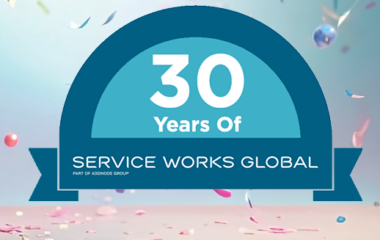As we step into the new year, Hazel Bedson, Marketing Director at Service Works International, and others in the industry comment on some of the trends the industry is likely to see in 2024 featured in Facilitate Magazine.
For starters, as labour market figures recently showed, there has been a decline in earnings growth in the latter months of 2023. According to Jon Boys, senior labour market economist for the CIPD, the professional body for HR and people development, this will be a respite to employers with hiring difficulties. However, Boys maintains that “the labour market remains competitive” despite the government’s plans to lower immigration and an ageing workforce – both of which will strain labour supply. He said: “In such conditions people have options and employers and policymakers should reach for the carrot before the stick when seeking to get people into work. Creating quality jobs that enable people to balance competing priorities is key. This means more than just pay, but careful job design too. Flexibility and autonomy are highly valued and allow people to manage a work-life balance.”
Sustainability
Mechanical and electrical and heating business Kimpton predicts “that closing the gap between retail gas and electricity prices will play a pivotal role in driving the shift from gas to electricity in homes and businesses” especially “with a potential change in government in 2024, there is an opportunity for a bold green statement that could reshape the energy market”.
Food services market
Antony Prentice, joint MD at BM Caterers, thinks that the ongoing workforce and labour challenges brought about by hybrid working will continue. Prentice told Facilitate: “Whilst we are settled into a new routine, there are still some moving parts to consider as organisations review their workforce patterns. The condensed working week has become more normal, and workplaces are requiring more hospitality services in a shortened time frame. Not only are the Tuesday, Wednesday, and Thursday office days significantly busier, but we are seeing evening events and the need for hospitality experiences really increase too. We also expect to see a continued increase in office-based working but at a slower rate of increase than in 2023.”
Flexibility will also be key as from time to time the normal patterns shift with occasional spikes in demand on the normally quieter bookend days of the week. In terms of kitchen hubs, Prentice stated that “we are expecting to deliver more food from our central kitchens which we use as a base for numerous city contracts” and “we are seeing more companies without kitchens looking to develop food offers as a means of attracting and retaining employees” and “we anticipate this will accelerate next year”.
He also stated that the sector expects to see “more complete operational integration into ESG strategies”. He said: “We have seen how this has evolved over the last year and expect it to ramp up in 2024. As a business, we’ve already taken huge strides in this area – offering every single member of our team sustainability training through our ‘Knowledge Labs’ approach. It ensures each team member is aware of the company’s overarching strategy.”
Peter Green, managing director at FusionFSM, a sales activation and insights business working for the food service market said one new trend is a demand for more diversity. Green told Facilitate that “new working patterns mean there is more of a demand for a more diverse range of food in catering outlets”. He said: “The traditional 9-5 Monday to Friday workplace traffic has changed significantly, with people coming into the office largely in the middle of the week. Whilst there, they are spending more time in the building, meaning increasing requests from caterers to provide all-day food options. Innovative, creative, healthy and fun menu options are an essential part of encouraging people to come back to their offices regularly. “We also expect to see recruitment challenges in hospitality easing as creative initiatives gather pace to encourage people to enter the sector as an exciting place to work and build their careers. The resilient hospitality market will be stronger and fitter in 2024, capitalising on the experiences gained during the difficulties of the past four years.”
Security
Mike Bluestone, executive director of Corps Consult, believes that in the security industry “monitoring the threat landscape is key”. He said: “As we move into 2024, terrorism, the global geopolitical situation, the increasing impact of disruptive protest movements, and more prolific cyber-attacks continue to be a concern. The key now is to ensure that intelligence and communication around those threats is accurate and effective – having a more predictive structure around understanding the threat landscape will mean that security providers and the businesses they protect are in a better position.”
Bluestone added: “When you understand the issues you might face, you’re better able to plan. We are already seeing the topic of resilience appearing more widely in terms of priorities and I would expect that to continue into the next year and beyond. Having access to advice from qualified security professionals along with knowledgeable security teams on the ground, who are informed and trained in how to handle the potential threats, is going to be key to helping business protect, recover and move forwards.”
AI
Hazel Bedson, group marketing director of Service Works International, also agrees that businesses will continue to make “bigger and better commitments to improving their operations and evidencing their progress” in terms of ESG goals. With the increasing prominence of article intelligence, it is likely technology will become increasingly embedded “into business processes boosting productivity which has been lacklustre since the financial crash”, according to Boys.
Bedson added: “Data is at the core of these decisions, informing where and how businesses can make savings and reduce their environmental impact. Thanks to new technologies including IoT and sensors, the data has improved significantly and provides more insight than ever before. AI has the potential to transform decision-making in all areas of facilities and estate.”
Prentice stated that “accountability and measurement is really going to be a hot topic for the new year” as “clients will want a more clinical analysis of data to enable them to plan their operations”. He thinks therefore the sector starts to “see how AI can be used as a tool for predicting catering levels and labour patterns to increase efficiency”.
Hybrid working
Tim Hysom, operations director at Anabas, predicts that the journey of how corporates use office space will continue alongside the hybrid working conversation. Hysom believes that many businesses are now “instigating more regular employee presence in the office”. He told Facilitate: “FMs will need to remain agile to office occupancy changes. “The role of FM has been cast into the spotlight over the last few years. Visibility will continue to increase and FMs will play a fundamental role in the future of the workplace. FM is now a larger part of the employee journey through the office and has evolved its traditional discipline and services to reflect this change.
“Technology and innovation will gain more traction in FM. Technology does have its limits though. FMs need to be clear on the purpose of the technology, the benefit it will provide and the impact on the environment to ensure they aren’t just investing in technology for the sake of it.” Julian Fris, director at consultancy Neller Davies, agreed that “hybrid working is here to stay”. He told Facilitate that “the much-vaunted return to work has been partial with different companies taking varying stances”.
“Fundamentally, some clients are struggling with lease breaks and would exit space quicker if they could. I think this will be a bigger issue next year as buildings fall out of or change use and remote working becomes more viable, although the lack of long-term engagement of teams is a serious consideration”. He added: “Soft FM, in particular, could be directly impacted, but the benefit is that it actually could relieve the pressure on staffing.” He also predicts that “occupiers will be forced to rethink space utilisation in the meantime” and pointed out that according to Tussell, “FM suppliers are struggling in the government sector whilst procurement is up, revenue is down”. One reason why “is the dreaded cost improvement targets – or deflators as they are called” and “the danger is increased when suppliers sign up to this and win the work on reduced margins with all the consequent liquidity and merger and acquisitions risks reducing choice in each sector”.
Fris believes that 2024 “will see an ongoing rise in small companies with disenchanted specialists spinning out of the over-regulated corporates and providing a more personalised service” as well as “more buyers & suppliers embracing collaborative working (like Vested Outsourcing) as they see the traditional models failing”. He added: “These models are transforming service provision at BP, J&J, Procter & Gamble, and more clients coming on board across the globe.”









